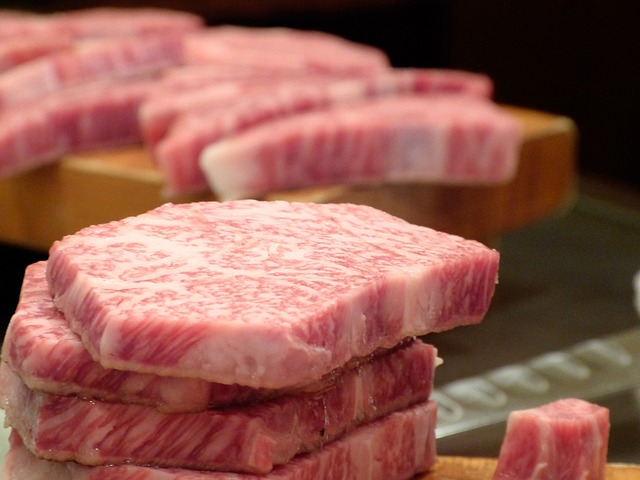昨日から「The Wagyu Olympics: The quest for the world’s best beef -「和牛オリンピック:世界一の牛肉を求めて」を読んでいます。

・「和牛オリンピック:世界一の牛肉を求めて」(1)
Both a competition and a trade show, the Wagyu Olympics always starts with a theme.
競技会であり、トレードショーでもある和牛オリンピックは、常にテーマを持ってスタートする。
For the 2022 event, the theme roughly translates to “shining a spotlight on the power of regional Wagyu beef”, which aims to highlight the diversity of Wagyu beef throughout the country.
2022年の開催テーマを大まかに訳すと「地域和牛の力にスポットライトを当てる」、全国にある和牛の多様性アピールが目的だった。
This year’s competition takes place 6-10 October and will see 41 prefectures competing for the best Wagyu, with the show attracting nearly half a million people during the five-day event.
今年は10月6~10日までの開催で、41の都道府県が最高の和牛を競い、5日間の開催期間中には50万人近い人々が訪れる。
Over the course of the week, pairs of breeding cows and fattening cows will be paraded and prodded and (sadly) slaughtered for Wagyu beef supremacy.
一週間にわたって、繁殖用牛と肥育用牛のペアが優勝を求めてパレードし、突かれ、(悲しいかな)屠殺される。
over the course of~「~のうちに、~の間に、~にわたって」。
prod「突く、刺激する、呼び起こす、~を刺激してさせる」。
But winning is only partially about competing.
しかし勝利は、この競争の一部でしかない。
It’s also about the Japanese concept of ikigai and the search for the Shangri-La of steak.
それは日本の「生きがい」の概念や、ステーキの理想郷を探すことでもあるのだ。
“[Ikigai] is a deep sense of purpose; the reason for getting up every morning; that which gives one’s life much of its meaning,”
「『生きがい』とは、深い目的意識、毎朝起きる理由、人生の多くの意味を与えてくれるものです」
said Andrea Fazzari, James Beard award-winning photographer and author of Sushi Shokunin.
と語るのはジェームズ・ビアード賞を受賞した写真家で、『Sushi Shokunin』の著者でもあるアンドレア・ファザーリ氏
“Iki means “life” and gai conveys a sense of value.
「生きは『命』、甲斐は『価値』を表す言葉です。
What a shokunin (master) does daily should not only bring him or herself meaning, but it should also bring meaning or pleasure to others.”
職人が日々行うことは、自分にとって意味があるだけでなく、他者にとっても意味や喜びをもたらすものでなければなりません。」
「生きがい」という言葉は、ikigai として、英語圏でも浸透しつつあるそうです。
これに当てはまる適切な単語が英語には無いらしく、こんな記事を読んでいると、確かに生きがいとはどういう事か?を、自分も改めて紐解く気持ちになります。
「生きがい」は結構、日本人を理解するキーワードかもしれませんね。
理由は単純明快!「少ないコストでしっかり楽しく学べるから」。
私自身の経験(高機能でビックリ)をびっしり書いていますので、良かったら読んでみてください。
下のバナーからどうぞ!






